|
Having previously submitted a short series of Posts from my deployment to Chad in 2010, I am once again in Africa and serving in Western Sahara, one of the more difficult environments I have deployed to in quite some time.
Patrolling the Deserts of Western Sahara
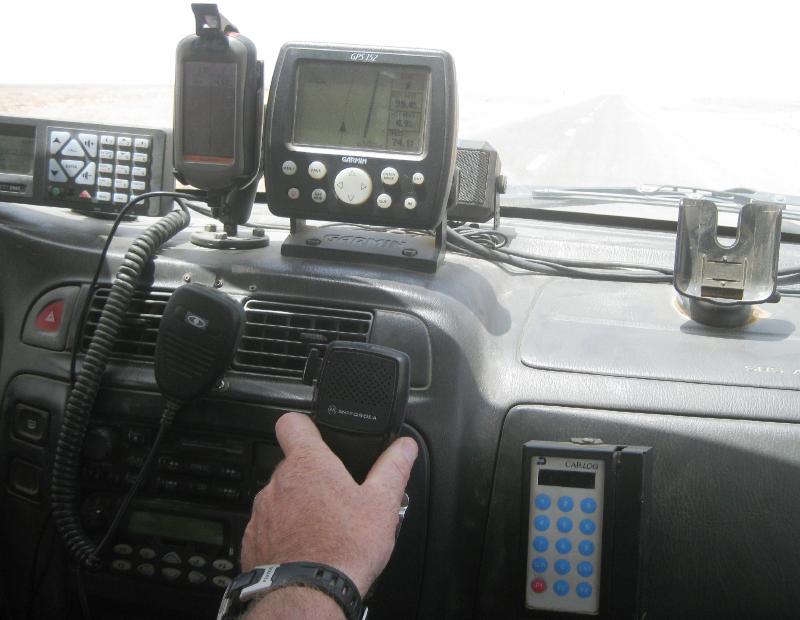
Communications and Navigation.
|
Returning to Africa is re-experiencing an assault on the senses, I had overnighted in the Canaries before getting a flight to Laayoune, the Capitol of Western Sahara and on arrival, as the cabin doors opened, Africa came flooding in with that strong earthy odour that you do not get in Europe or indeed the Middle East. It is as if the passing millennia had imbued the continent with an overrich array of smells. The next to tingle your senses is the blast of warm air that nearly sucks your breath away, before you head to the imagined comfort of the arrivals area, however the hoped for air conditioning is limited to a few lazily spinning ceiling fans that just seem to spread the heat around to all and sundry. It is while waiting in the queue at passport control that you realise that you have left Europe far behind as crowds of ululating women cry out their greetings to loved ones just arrived, in plaintive high pitched voices. Welcome to Africa.
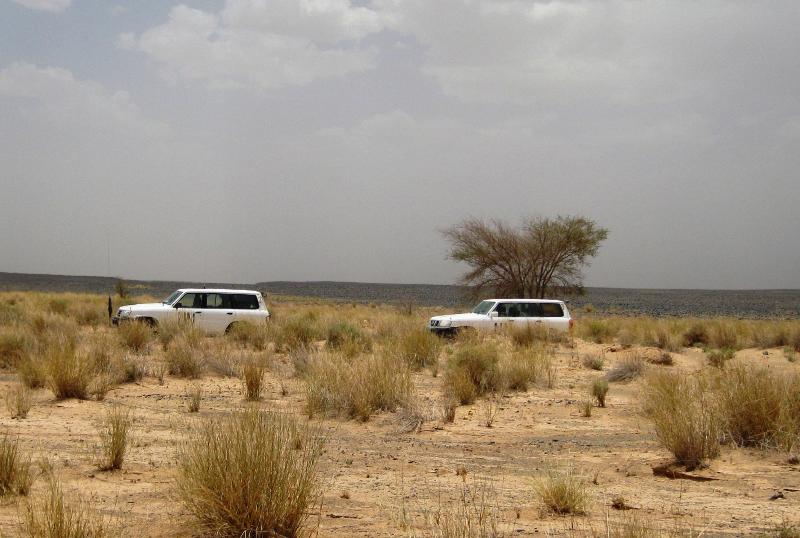
Lunch Stop
|
I was asked would I serve in the UN mission to Western Sahara only 4 weeks earlier and those few weeks sped by in a flurry of inoculations, collecting of kit, getting my main luggage sent on in advance by DHL, and of course trying to get some quality time with my family. This mission ,MINURSO, (Mission des Nations Unies pour l'Organisation d'un Referendum au Sahara Occidental) was established in 1991, following a ceasefire between the Royal Moroccan Army and the Frente POLISARIO (frente Para la Libaracion de Saguia el Hamra y Rio de Oro), who were waging a protracted guerrilla war over what had been a Spanish Colony. The mission's explicit aim was to oversee the introduction of a referendum for the self determination of the people of Western Sahara. This process has moved slowly and MINURSO monitors the ceasefire, verifies the agreed reduction in troops of both sides and monitors the confinement of troops of both sides to agreed locations. Morocco would have always considered the area to be part of Morocco, while the Frente POLISARIO have fought against Spain, Morocco and also Mauretania, to gain independence for the local Saharawi peoples. Western Sahara covers approx 266,999 sq kms and is the least densely populated country on earth; the latest estimate for its population is approx 513,000 with approx 100,000 refugees in Tindouf, across the border in Algeria.
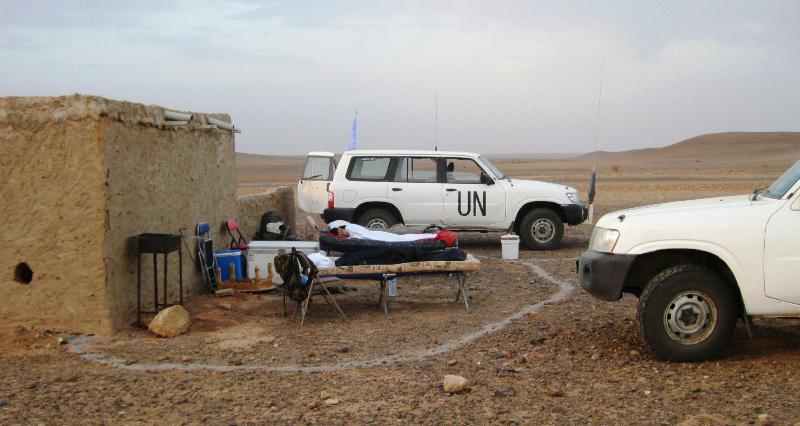
Snake Protection at Overnight Camp
|
The crackly, metallic, distorted and faint voice on the HF (High Frequency) radio is our only contact with civilisation some 250kms away at our Team Site in Smara, as we continue on our second day of patrolling. The vastness and inhospitality of this terrain is somewhat overwhelming as we follow faint tracks, or more often the GPS (Global Positioning System) navigation system in our vehicles. There are no roads as such, here in the desert but a series of ill defined tracks that could lead anywhere and considering this is one of the most mined places on earth it is critical to be spot on with your navigation. Last night we established a temporary camp near a ruined and abandoned mud hut, scant evidence for earlier travellers. Somewhat optimistically I spread a covering of snake repellent powder as a barrier around the 2 cars and fell into a fitful sleep as the desert wind blew hot and wild around us. For the previous few days the midday temperatures hovered well above 54 degrees and by the time we had established a camp it had dropped to just below 40 degrees but the incessant wind was to blow hot dry air around us until well after midnight. To put 54 degrees into context, I had to use the team's camera while on patrol and it was in the shade, in its case, inside in the glove compartment of the vehicle. When I took it out of the case I couldn't touch the bare metal of the camera without a cloth to stop me getting burnt!!
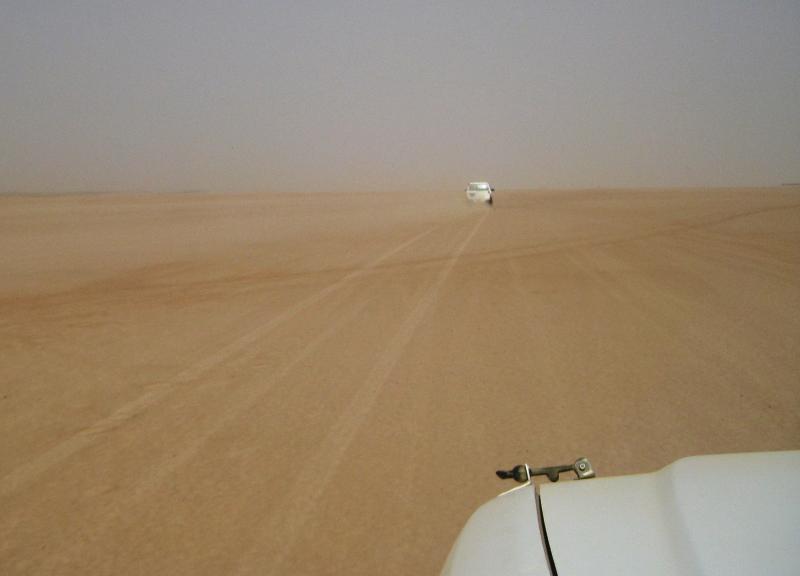
Patrolling the desert.
|
In an attempt to construct a picture of how desolate this place is, you could imagine yourself standing at Mizzen Head in Co. Kerry and knowing there was no habitation between you and Malin Head in Co. Donegal, and then consider the same feeling as you turn to the East, South and West. The rocky desert stretches as far as the eye can see and farther than the mind can imagine. It shrinks your concept of space until you are often only concentrating on the narrow stretch of track in front of you and its relationship to the tiny 3 inch by 2 inch map on the GPS system mounted on the dash of the car. Although the last available information is that the population of Western Sahara is approx 500,000 people with a further 150,000 refugees in Algeria, there here has been of course, a major influx of Moroccans lured by higher wages and cheaper prices and not forgetting the presence of approx 120,000 Moroccan troops to maintain the part of the country they seized during the war years of 1976 to 1988. In fact our main purpose during our patrolling is to verify the position of various units of the Royal Moroccan Army as part of the cease fire agreement.
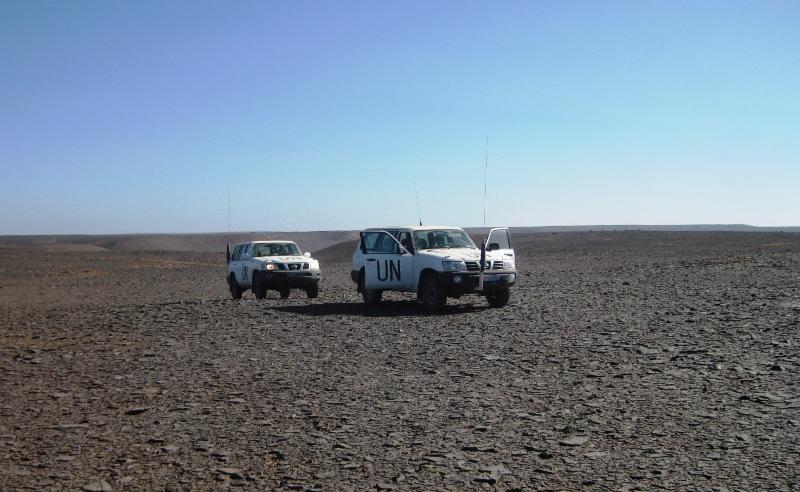
Rocky Desert.
|
This we do on our side of the ceasefire line and our colleagues deployed on the POLISARIO side carry out the same intensity of patrolling. The ceasefire line is defined by the ‘Berm' an impressive piece of human engineering that commences 200kms inside Morocco and then travels approx. 2000kms to the Mauritanian border. It averages 3m high and 4 m at the base and has on the Eastern and Southern sides (POLISARIO side) the biggest and longest minefield in the world. In fact there is not just one berm but a series of them, constructed in the early 1980s in an attempt to prevent the successful guerrilla style war being waged by the POLISARIO.
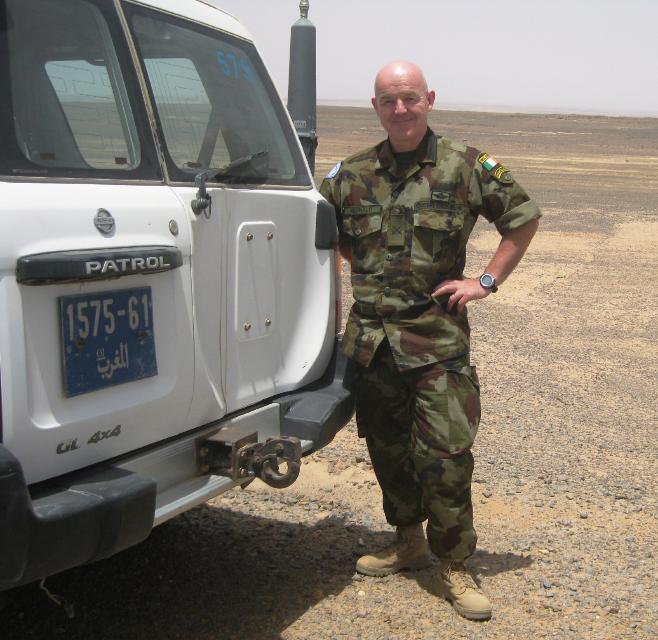
Mack in the Desert
|
The area that we in our team site are responsible for, is approx. 46,000kms and to do this we should have 20 military observers, a helicopter crew of 12 and a medical back up unit of four. However because of a number of factors, including leave, we generally have a strength of 13 military observers and out of that we conduct three patrols per day 7 days a week, at least one overnight patrol per week and a heli patrol every week. Needless to say the pressure is intense as work does not stop after an 8 hour patrol, the vehicles have to be cleaned of sand and dust, refuelled, patrol reports prepared, and the following days patrol planned, routes downloaded into the GPS, rations drawn, emergency equipment tested, and then when all that is done, each of us have our secondary tasks such as Operations Officer, who plans and co ordinates all the patrols for the month, Logistics Officer, who plans and co ordinates all the food, fuel, including Jet A1 for the heli, engineering works, repairs to vehicles and equipment etc, water replenishment, both for drinking and washing, Intelligence Officer who collates all necessary information on the strength and dispositions of both sides, assesses the patrol routes for mine threats and remnants of war such as unexploded ordnance, Administration Officer, who administers all the necessary paperwork from in processing to out processing, leave, medical etc. So it is a hectic pace here and since arrival on the Team Site 4 weeks ago, I have not had a full day off, not that you could go anywhere but a lie in after 0630 would be welcome.
That's all for now bit will update in the future.
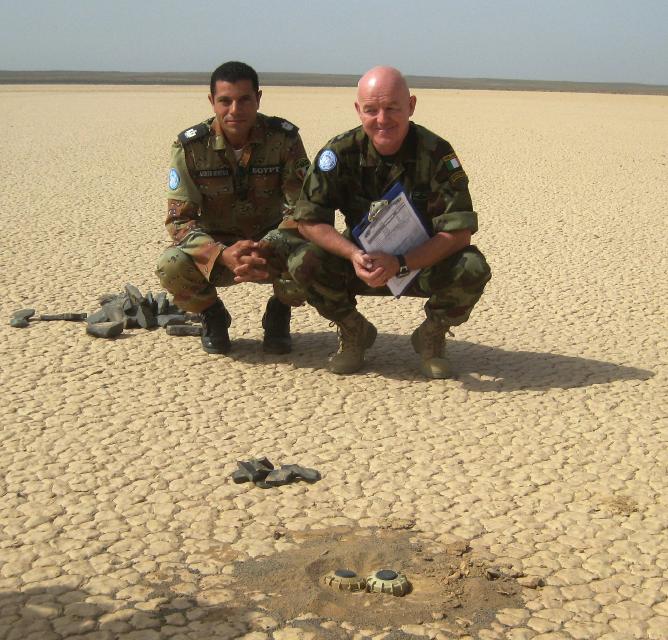
Destruction of Land Mines.
|
PS Just heard Mayo won...Come on the All Ireland
Commandant Kevin McDonald is a son of Paraic and Bernie McDonald of Greenfields, Pontoon Road Castlebar. He has previously served overseas in Lebanon in 1984/84, 1993 and 1996, Israel, Syria and Lebanon from 2005 to 2007 and Chad in 2010 from where he contributed a series of articles for Castlebar.ie
|